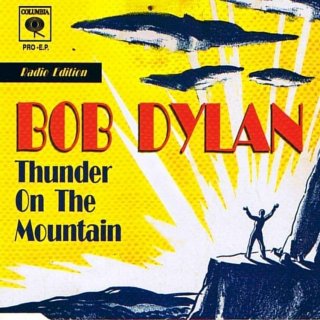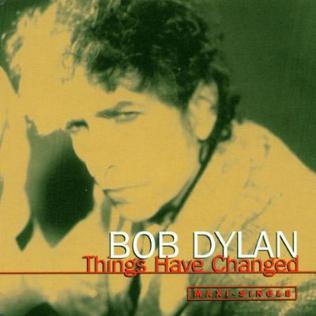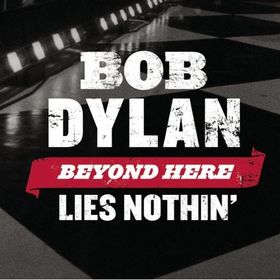Related Research Articles
"Coyote" is a song by Canadian singer-songwriter Joni Mitchell from her eighth album Hejira (1976). It was released as the album's lead single.
"Spirit on the Water" is a love ballad written and performed by the American singer-songwriter Bob Dylan, released in 2006 as the second track on his album Modern Times. The title is a reference to a passage in the Book of Genesis. It is notable for being the only song on Modern Times to feature a harmonica solo. As with much of Dylan's 21st-century output, he produced the song himself under the pseudonym Jack Frost.
"Nettie Moore" is a folk love song written and performed by American singer-songwriter Bob Dylan, released in 2006 as the eighth track on his album Modern Times. As with much of Dylan's 21st-century output, he produced the song himself under the pseudonym Jack Frost.
"Ain't Talkin" is a song written and performed by the American singer-songwriter Bob Dylan, appearing as the tenth and final track on his 2006 album Modern Times. As with most of Dylan's 21st century output, he produced the song himself under the pseudonym Jack Frost.
"High Water " is a song written and performed by the American singer-songwriter Bob Dylan, released as the seventh track on his 31st studio album "Love and Theft" in 2001 and anthologized on the compilation album Dylan in 2007. Like much of Dylan's 21st century output, he produced the track himself under the pseudonym Jack Frost.
"Mississippi" is a medium-tempo country-rock song by the American singer-songwriter Bob Dylan that appears as the second track on his 2001 album Love and Theft. The song was originally recorded during the Time Out of Mind sessions, but was ultimately left off the album. Dylan rerecorded the song for Love and Theft in May 2001.

"Thunder on the Mountain" is a song written and performed by American singer-songwriter Bob Dylan, released in 2006 as the first track on his album Modern Times. Like much of Dylan's 21st century output, he produced the song himself under the pseudonym Jack Frost.

"Things Have Changed" is a song from the film Wonder Boys, written and performed by Bob Dylan and released as a single on May 1, 2000, that won both the Academy Award for Best Original Song and the Golden Globe Award for Best Original Song. It was also anthologized on the compilation albums The Essential Bob Dylan in 2000, The Best of Bob Dylan in 2005 and Dylan in 2007.
"Workingman's Blues #2" is a song written and performed by American singer-songwriter Bob Dylan, released as the sixth track on his 2006 album Modern Times. As with much of Dylan's 21st-century output, he produced the song himself under the pseudonym Jack Frost.

"Beyond Here Lies Nothin' " is a song written by American singer-songwriter Bob Dylan and performed by Dylan as the opening track on his 2009 studio album Together Through Life. The title is a quote from the ancient Roman poet Ovid. The track was available as a free download on Dylan's official website from March 30 to March 31, 2009, and a photo montage set to the song premiered on Amazon on April 21. It has been anthologized on every reissue of The Essential Bob Dylan since 2010. Like much of Dylan's 21st century output, he produced the song himself using the pseudonym Jack Frost.

Christmas in the Heart is the thirty-fourth studio album and first Christmas album by American singer-songwriter Bob Dylan, released on October 13, 2009, by Columbia Records. The album comprises a collection of hymns, carols, and popular Christmas songs. All Dylan's royalties from the sale of this album benefit the charities Feeding America in the USA, Crisis in the UK, and the World Food Programme in perpetuity.
"Must Be Santa" is a Christmas song written by Hal Moore and Bill Fredericks and first released in November 1960 by Mitch Miller on Columbia 41814. A cover version by Tommy Steele reached Number 40 on the UK Singles Chart a year later. Another cover, by Joan Regan made number 42 a week later.

"Duquesne Whistle" is a song written by Bob Dylan and Grateful Dead lyricist Robert Hunter that appears as the opening track on Dylan's 2012 studio album Tempest. It was first released as a digital single on August 27, 2012 through Columbia Records then as a music video two days later. A limited edition "Record Store Day" 7" stereo single was released on November 23, 2012. It was also anthologized on the 2014 reissue of The Essential Bob Dylan. Like much of Dylan's 21st-century output, he produced the song himself using the pseudonym Jack Frost.
"Soon After Midnight" is a song written and performed by American singer-songwriter Bob Dylan that appears as the second track on his 2012 studio album Tempest. Like much of Dylan's 21st-century output, he produced the song himself using the pseudonym Jack Frost.
"Narrow Way" is a blues rock song written and performed by American singer-songwriter Bob Dylan that appears as the third track on his 2012 studio album Tempest. Like much of Dylan's 21st-century output, he produced the song using the pseudonym Jack Frost.
"Long and Wasted Years" is a song written and performed by Bob Dylan that appears as the fourth track on his 2012 studio album Tempest and was anthologized on the 2016 reissue of The Essential Bob Dylan. Like much of Dylan's 21st-century output, he produced the song himself using the pseudonym Jack Frost.

Triplicate is the thirty-eighth studio album by Bob Dylan, released by Columbia Records on March 31, 2017. As with most of Dylan's 21st century output, he produced the album himself under the pseudonym Jack Frost.
"Lonesome Day Blues" is a twelve-bar blues song written and performed by Bob Dylan that appears as the fifth song on his 2001 album Love and Theft. Like most of Dylan's 21st century output, he produced the song himself under the pseudonym Jack Frost.
"It's All Good'" is a blues song written by American singer-songwriter Bob Dylan that appears as the 10th and final track on Dylan's 2009 studio album Together Through Life. Like much of Dylan's 21st century output, he produced the song himself using the pseudonym Jack Frost.
"Key West " is a song written and performed by the American singer-songwriter Bob Dylan, released as the ninth track on his thirty-ninth studio album, Rough and Rowdy Ways (2020). The tracks for the album were written by Dylan at his home in Point Dume in late 2019 and early 2020. It was recorded at Sound City Studios in Los Angeles in January and February 2020 and released in June 2020. The song is an accordion-driven ballad that incorporates references to other songs and to the City of Key West.
References
- ↑ McCormick, Neil (2021-05-07). "Bob Dylan at 80: From Elton John to Bono, stars reveal the man behind the 'unknowable' genius". The Telegraph. ISSN 0307-1235 . Retrieved 2021-05-08.
- ↑ Margotin, Philippe; Jean-Michel Guesdon (2015). Bob Dylan : all the songs : the story behind every track (First ed.). New York. ISBN 978-1-57912-985-9. OCLC 869908038.
{{cite book}}: CS1 maint: location missing publisher (link) - ↑ "Pay in Blood | dylanchords". dylanchords.com. Retrieved 2021-05-28.
- ↑ Miller, Mike (2020-06-29). "Bob Dylan: Latest Recordings". Ticket 2 Ride. Retrieved 2020-12-18.
- ↑ "Bob Dylan, 'Tempest': Track-By-Track Review". Billboard. Retrieved 2020-12-18.
- ↑ "Pay in Blood | The Official Bob Dylan Site". www.bobdylan.com. Retrieved 2020-12-18.
- ↑ "Pay in Blood: the meaning of the music and the lyrics | Untold Dylan". 5 September 2014. Retrieved 2020-12-18.
- ↑ Hallgeir (2016-07-10). "Great song: Pay in Blood by Bob Dylan – A land built on slavery". All Dylan - A Bob Dylan blog. Retrieved 2020-12-18.
- ↑ Gilmore, Mikal (2012-09-27). "Bob Dylan Unleashed". Rolling Stone. Retrieved 2020-12-18.
- ↑ "50 Best Songs of 2012". Rolling Stone. 2012-12-05. Retrieved 2020-12-18.
- ↑ Vozick-Levinson, Jon Dolan, Patrick Doyle, Andy Greene, Brian Hiatt, Angie Martoccio, Rob Sheffield, Hank Shteamer, Simon; Dolan, Jon; Doyle, Patrick; Greene, Andy; Hiatt, Brian; Martoccio, Angie; Sheffield, Rob; Shteamer, Hank; Vozick-Levinson, Simon (2020-06-18). "The 25 Best Bob Dylan Songs of the 21st Century". Rolling Stone. Retrieved 2020-12-18.
{{cite magazine}}: CS1 maint: multiple names: authors list (link) - ↑ Vozick-Levinson, Jon Dolan, Patrick Doyle, Andy Greene, Brian Hiatt, Angie Martoccio, Rob Sheffield, Hank Shteamer, Simon; Dolan, Jon; Doyle, Patrick; Greene, Andy; Hiatt, Brian; Martoccio, Angie; Sheffield, Rob; Shteamer, Hank; Vozick-Levinson, Simon (2020-06-18). "The 25 Best Bob Dylan Songs of the 21st Century". Rolling Stone. Retrieved 2021-05-30.
{{cite magazine}}: CS1 maint: multiple names: authors list (link) - ↑ "Bob Dylan's 20 Best Songs of the '10s and Beyond". Spectrum Culture. 2021-02-19. Retrieved 2021-05-05.
- ↑ Hallgeir (2016-07-10). "Great song: Pay in Blood by Bob Dylan – A land built on slavery". All Dylan - A Bob Dylan blog. Retrieved 2020-12-18.
- ↑ TonyAttwood (25 August 2019). "Bob Dylan And Plutarch | Untold Dylan" . Retrieved 2020-12-18.
- ↑ "Bob Dylan Tour Statistics | setlist.fm". www.setlist.fm. Retrieved 2020-12-18.
- ↑ "The 25 Best Bob Dylan Songs of the 21st Century". Rolling Stone. 18 June 2020. Retrieved 2021-03-15.
- ↑ "50 Best Songs of 2012". Rolling Stone. 5 December 2012. Retrieved 2021-03-15.
- ↑ "Bob Dylan's 20 Best Songs of the '10s and Beyond". Spectrum Culture. 2021-02-19. Retrieved 2021-03-15.